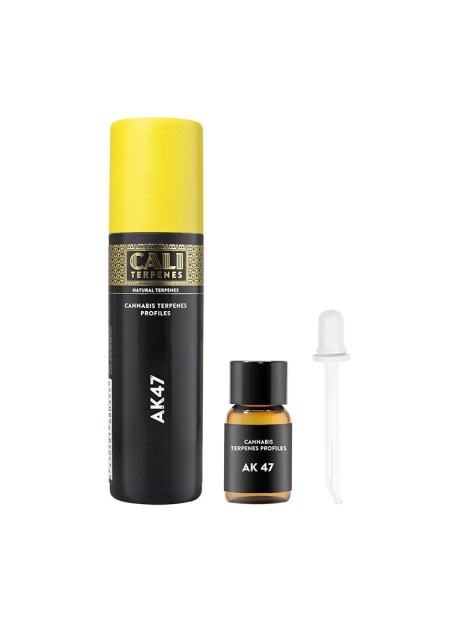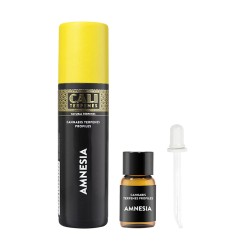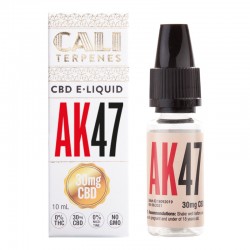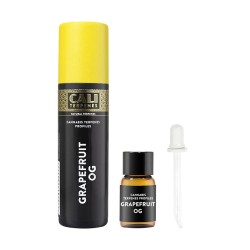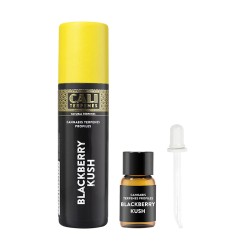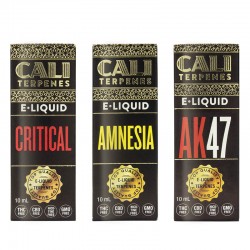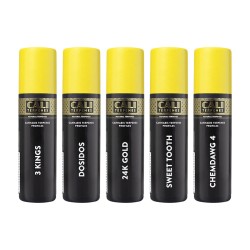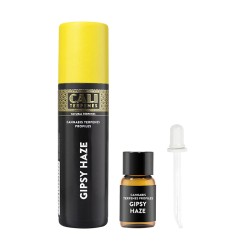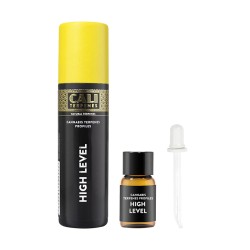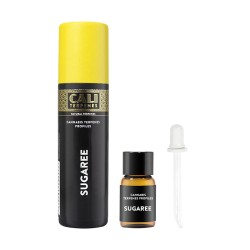GET AMAZING GIFTS WITH ALL OF YOUR PURCHASES!
AK 47 TERPENES
The AK 47 terpene profile by Cali Terpenes is used, among other things, to provide the aroma and flavor produced by this legendary strain, as well as increasing the beneficial properties of all types of products, including:
- Liquid vaping bases (to make e-liquids)
- Cannabis extracts and concentrates (rosin, dry, BHO, distillates etc)
- Hemp or cannabis flowers
- Edibles and beverages; check out our catalogue of food-grade terpenes
- Cosmetics and aromatherapy
This product doesn’t contain cannabinoids: 0.00% THC, CBD, etc. 100% aroma in liquid format.

The AK 47 Cannabis terpene profile by Cali Terpenes is a terpene combination that has the same aromatic composition as an terpene extract from the legendary cannabis strain AK 47 (American selection).
Made using the highest quality prime materials proceeding from GMO-free crops, without pesticides or any contaminating agents.
AK47 terpenes don’t contain any type of thinner or diluent, nor do they contain cannabinoids (THC, CBD, CBG, CBN…). 100% aroma in liquid format.
Myrcene, Caryophyllene, d-Limonene, D-Alpha-Pinene, Alpha-Pinene, Beta-Pinene.
AK 47 terpenes by Cali Terpenes have a sweet and fruity aroma and flavor that's similar to blueberries, with intense hints of pine and earth.
The terpene profile AK 47 acts alongside other elements such as cannabinoids in what's known as the entourage effect. In products such as flowers, extracts or tinctures which contain cannabinoids, terpenes can contribute to the effect they produce.
In this case, AK 47's terpene profile produces a stimulating and creative sensation.
Ideal for alleviating stress, improving the mood and stimulating the appetite.
Our Terpenes have an endless list of uses, although mainly they're used to provide flavors and aromas of specific cannabis strains to all types of products, such as:
- Vapable liquids (e-liquids)
- Concentrates and cannabis extracts (rosin, dry, BHO, CBD and THC distillates for vaping in Vape Pens).
- Edibles and beverages; check out our food grade terpene catalogue.
- Hemp or cannabis flowers.
- They're also used to enrich cosmetic products (creams, perfumes etc.)
- Can be used with all types of tools and systems designed for aromatherapy (difussors, candles, essential oils etc).
If you need more info on how to use terpenes, check out our Terpene Use Guide!
These terpenes are 100% pure, so they need to be handled with caution and should never be consumed without being mixed with the destined product (except for cold tastings, in which terpenes are used in their pure state).
Once diluted in the desired product and in the right proportion, terpenes are 100% safe and provide aromas and other benefits.
1ml terpenes = 40 drops (0.025ml per 1ml dropper drop), so 1 drop of terpenes represents around 0.25% approx. of 10ml of liquid base:
- 1 drop in10ml = 0.25%
- 2 drops in 10 ml = 0,50%
- 4 drops in 10ml = 1%
- 8 drops in 10ml = 2%
- 12 drops in 10ml = 3%
*It's recommended to test quantities starting at the lowest, as our terpenes have an easily intense aroma and flavor when used.
Check out our terpene guide to find out more about terpene uses and methods.
Liquid Vaping Bases (for creating e-liquids)
The recommende amount of terpenes and the most used in order to provide enough flavor to e-liquid bases is between 1 and 3% terpenes (you can use up to 4, although the most common is 2%)
For example, if you wanted to add 2% terpenes to 10ml e-liquid base, you only need to use 0.2ml terpenes, and for 100ml e-liquid base and 2% terpenes, you should add 2ml.
HOW TO MAKE E-LIQUIDS WITH TERPENES
Cannabis Extracts and Concentrates
The recommended and most common amount of terpenes used to add enough flavor and aroma to dry extracts (dry hash or traditional hash), jelly, BHO (wax, shatter, live resin...) rosinor THC and CBD distillates is between 1 and 3% terpenes (you can use up to 4% maximum, although the norm is 2-3%).
For example, in order to add 3% terpenes to 10g cannabis concentrate such as clear, a type of distillate, you only need 0.3ml of terpenes.
We highly recommend testing the amount used, starting small - for example, use 1 drop for 3g, 1 for 2g, 1 for 1g, and then wait a few days to test them out and see which one is best for yoru specific taste depending on the proportions used.
It's important to properly mix your creation so that the results are even and balanced, and you should let it sit for at least 24/48h before consuming it so that the terpenes can be fully absorbed.
Another great way to add terpenes to extracts is to use Terps Spray.
Discover how to add terpenes to cannabis extracts and concentrates step by step with our guide:
HOW TO USE TERPENES IN EXTRACTS
Hemp or Cannabis Flowers
Terpenes can also be used to increase and improve the aroma produced by hemp or cannabis flowers (buds). It's not recommended to add over 4% terpenes to flowers, and in some cases you may need to use even less as the flowers may already contain some of their own terpenes. An excess of terpenes can produce an intense aroma that may be too much and not pleasant at all.
The ideal way to use terpenes with flowers, buds and dry herbs is by using Terps Spray.
Discover everything you need to know about Terps Spray in our posts:
WHAT'S TERP SPRAY AND HOW TO USE IT
If there's a smaller amount to spray (from 1g to 10g), it might be cheaper to use a sheet of dryer paper with a couple of drops of terpenes, and place it in an airtight container alongside the dry flowers - after a few hours, they should smell much better.
We recommend storing flowers in airtight and/or vacuum sealed containers, as this allows terpenes to fully soak in to the flowers, providing a more even and balanced experience.
Edibles and Beverages
The correct proportion of our terpenes (cannabis aromas) recommended for food and beverages is a lot lower than that used in e-liquids and cannabis products.
The amount of terpenes always depends on the base of the food or beverage being made, as well as the process used.
We recommend using terpenes during the cold processes and when there are no pressure changes (for example, vacuum drying) as this stops possible evaporation and allows for them to fully dissolve and be absorbed into the food or beverage.
Some examples of proportions used in food and beverages are:
- Ice cream: from 0.025 to 0.1ml for approx. 1kg depending on the desired intensity
- Beer: from 0.01 to 0.05ml terpenes for approx. 1L of beer, depending on the type of beer, the point of the process in which terpenes are added, and the desired intensity.
- Soda water: from 0.01 to 0.05ml for approx. 1L of water, depending on the desired intensity.
- Oils: from 0.1 to 0.3ml terpenes per 1L of oil, approx., depending on the intensity of the oil and the desired aromatic intensity.
- Honey: from 0.1 to 0.5ml of terpenes for 1 to 2kg of honey approx. depending on the intensity of the honey and the aromatic intensity desired.
- Chocolate: from 0.25 to 1ml per approx. 1KG, depending on the type of chocolate and aromatic intensity desired.
*In most cases, letting terpenes sit for a while can help them settle better. For example, honey with terpenes has more flavor 24h after applying compared to freshly applied.
- Our terpene profile packaging have safety valves, anti-leakage technology and screw tops.
- After using the product we recommend placing each element back to avoid possible terpene evaporation or contamination.
- Terpenes are volatile compounds, their recommended storage is in a fridge (approx. 7 degrees C) to avoid evaporation when use.
- The temperature at which terpenes are handled should never go over 60ºC to avoid evaporating the most volatile terpenes.
- Keep terpenes in their original container at all times, as the material used (dark glass that doesn't allow UV rays through) is designed to better preserve thermo or photosensitive products. This protects them from changes in temperature, cross contamination etc (terpenes can act as a diluent and corrode materials such as plastic).
- Cali Terpenes S.L. is registered as an exporting company with the FDA (Food and Drugs Association).
- Cali Terpenes follows all European vaping guidelines.
If you need technical sheets or safety data on our terpenes, please get in touch with us.

Data sheet
- Aromatic notes
- Blueberries
Earthy
Fruity
Pine
Sweet - Main terpenes
- Cariophylene
Limonene
Myrcene
Pinene - Original genetic family
- Afghan
Sativa Colombia
Sativa Mexico
Sativa Thailand - Entourage effect
- Stimulating
- CBD content
- Without CBD
Specific References
Customers who bought this product also bought:
Questions (1)
Comment utiliser ceci, il faut mélanger avec de l’eau ? De l’alcool ? 96ml pour 4ml de terpene ?
Bonjour,
Nos terpènes sont 100% purs, vous devez donc les manipuler avec précaution et ne pas les consommer non dilués (sauf pour les dégustations dans des vaporisateurs à froid, dans lesquels le terpène pur peut et doit être utilisé). Une fois dilués dans le produit que vous souhaitez et dans la bonne proportion, ils sont totalement sûrs et procurent des avantages à tous les types de produits.
1 ml de terpènes = 30 gouttes métriques (0,03 ml par goutte), donc 1 goutte de terpènes représente environ 0,33 % dans 10 ml de base.
Nous recommandons toujours de tester de la plus petite à la plus grande quantité, car nos terpènes fournissent facilement une saveur et un arôme intenses.
- Fleurs de chanvre ou de cannabis :
Les terpènes sont également utilisés pour augmenter l'arôme et la saveur des fleurs de chanvre ou de cannabis. Les plantes de cannabis ne contiennent pas plus de 4 % de terpènes, mais selon le degré de professionnalisme de votre méthode d'application, vous aurez besoin de plus ou moins de terpènes pour ajouter de l'arôme et de la saveur.
La méthode idéale consiste à utiliser un assainisseur d'air, ajouter 5 à 20 ml pour 1 kg de fleurs (de préférence dans un séchoir vertical) et à l'intérieur d'un espace clos, comme une tente de culture dans laquelle l'extraction est utilisée pour recirculer et ré-entrer les terpènes restants vers le séchoir.
- Epicerie et boissons :
La proportion de nos terpènes (arômes de cannabis) destinés à être utilisés dans les aliments et les boissons est bien inférieure à celle utilisée dans les e-liquides ou les produits à base de cannabis. La quantité de terpènes à utiliser dépendra toujours de la base comestible ou de la boisson à aromatiser, en plus du processus dans lequel elle est appliquée.
Nous recommandons d'appliquer les terpènes toujours dans des processus à froid et qui ne présentent pas d'énormes changements de pression (par exemple, l'application d'un vide), car de cette façon, ils ne s'évaporeront pas et seront parfaitement intégrés dans la nourriture ou la boisson.
Voici quelques exemples de ratios à utiliser dans les aliments et les boissons :
Glace : Environ 0,025 ml à 0,1 ml pour 1 kg.
Bière : env. 1ml de terpènes pour 3L de bière.
Eau pétillante : env. 1 ou 2 gouttes pour 1L d'eau.
Huiles : env. 1ml de terpènes pour 3L d'huile.
Miel : env. 1ml de terpènes pour 1 ou 2kg de miel.
La température de travail avec les terpènes ne doit pas dépasser 60°C pour éviter l'évaporation des terpènes les plus volatils.
Un saludo,

